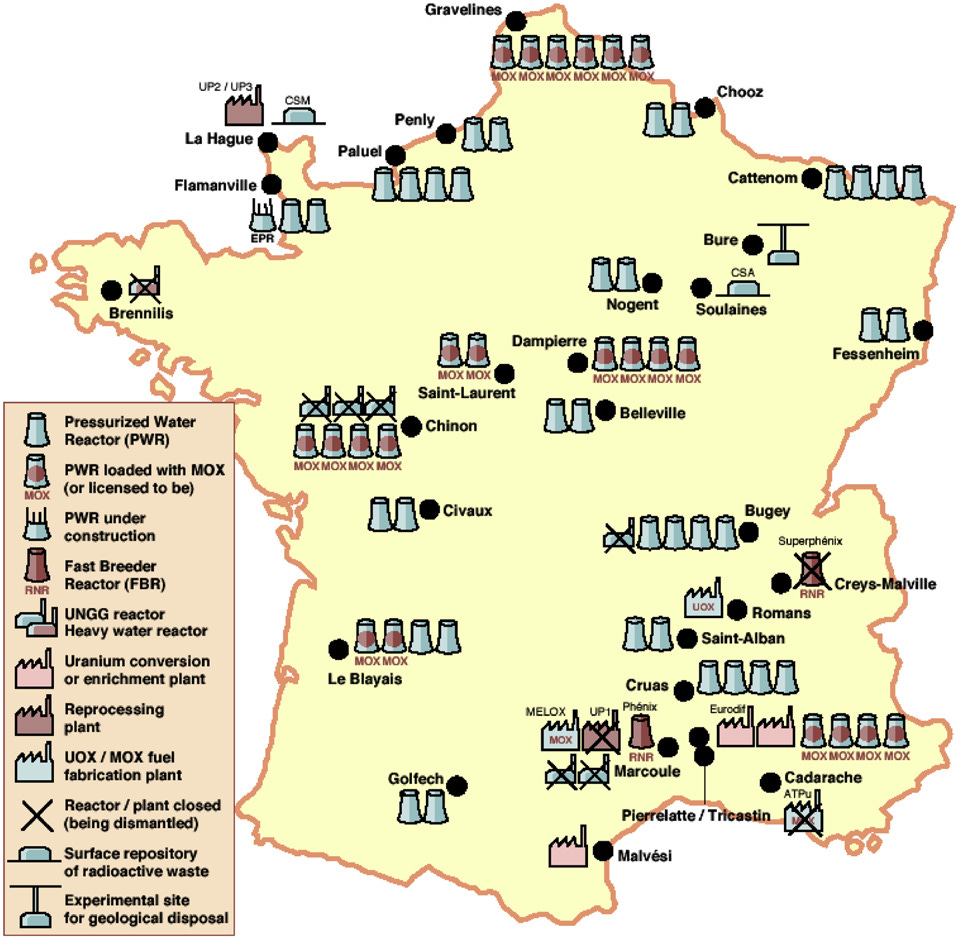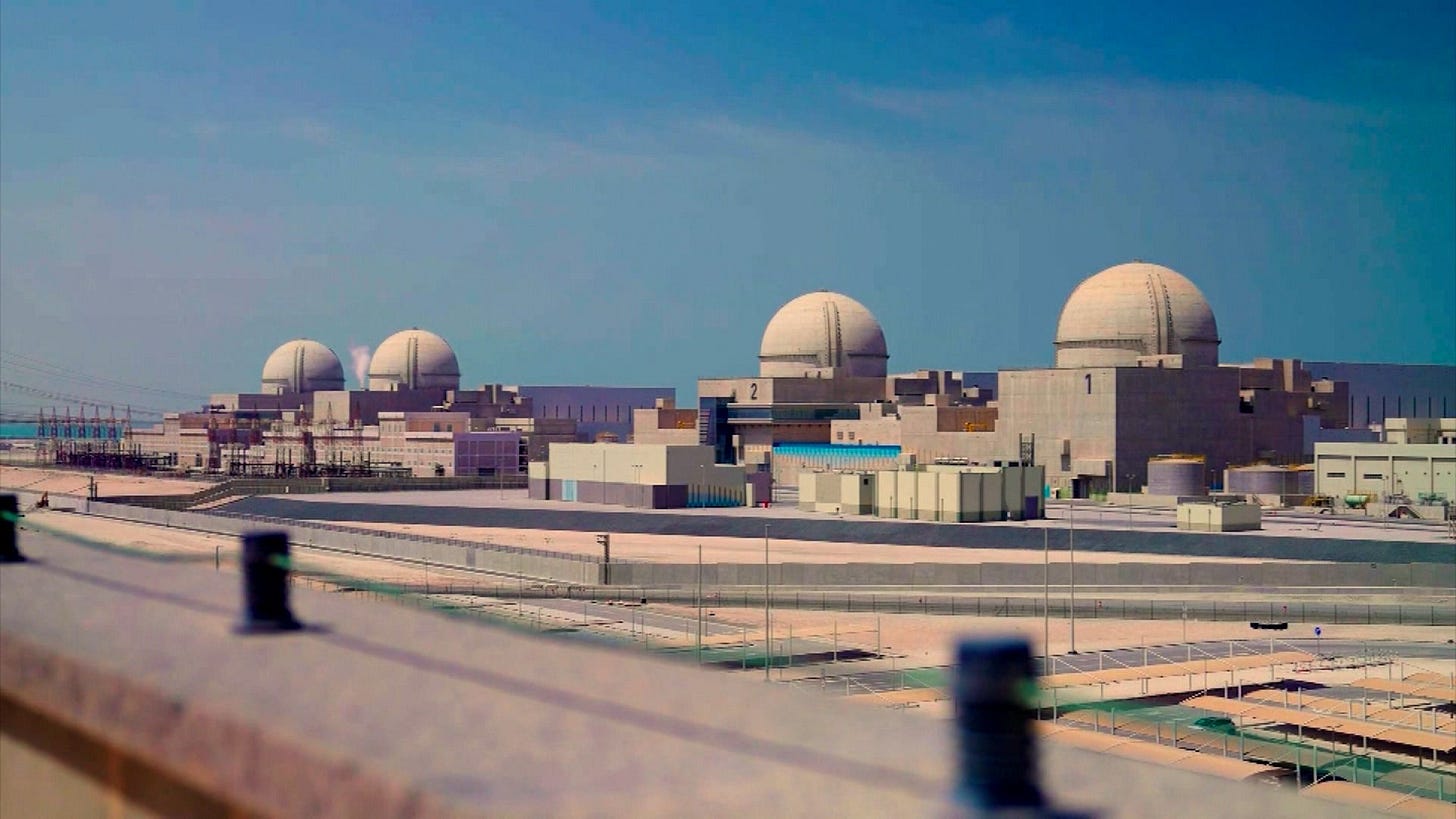Atomic energy is too important a development to be made the subject of profiteering.[Harry S Truman]
Figure 1. French Nuclear Installations
The minuscule minority of the choir that has read the Make Nuclear Cheap Again (MNCA) book will be aware that the argument proceeds in two basic steps.
1. DNA Repair is Real and Critically Important. Our bodies are equipped with a remarkably effective system for repairing damage to our DNA. Nature had to provide us with this capability to protect us from the massive DNA damage caused by our oxygen based metabolism. The current regulatory harm model, LNT, claims this repair system does not exist. As a result, it over-predicts the cancer incidence associated with the dose rate profiles which will be incurred by the public in a nuclear power plant release by multiple orders of magnitude. LNT must be replaced by a radiation harm model that does recognize our DNA repair ability. Once you do that you find that the potential harm to the public produced by even a very big release is similar to the risks associated with other industrial activities such as dams and chemical plants.
2. Use the Insurance System to Balance Cost and Harm. We need a system that balances that risk with cost in such a way that maximizes overall social welfare. The MNCA book proposes an insurer based system combined with a government mandated and run compensation program for radiation exposure.
In my infallible opinion, the first step, the DNA repair argument, is a slam dunk. The existence and efficacy of our DNA repair system is indisputable. But the second step, how we balance the resulting risk with cost (aka consumption of the planet's precious resources) is a matter of legitimate debate.
If like Truman we are not willing to trust fission electricity to the market, then we must find another way. We've tried the independent regulator regime, a special purpose tribunal whose overriding priority is nuclear safety (aka preventing a release), and whose decisions are unchallengeable dogma. This has been an auto-genocidal disaster. Such a system intrinsically puts far too much weight on nuclear harm, while ignoring the far greater harm caused by making nuclear expensive. The results range from tragically silly to humanity threatening cataclysmic. This system is irredeemable.
The French Model
If we are not going to trust the market, then we must go all the way the other way: a public monopoly responsible for providing reliable electricity at an acceptable level of risk, and the monopoly decides what's acceptable. This was the French system until 2006. There was no independent regulator. EDF was the monopoly. The nominal regulator, the Commissariat pour l'Energie Atomique (CEA), like the EDF was part of the Ministry of Industry. Here's how Grubler ponderously put it.
We exclude the French regulatory bodies as either residing within government (the Ministry of Industry) or being controlled by the CEA in this taxonomy, as there is no documented incidence in 1970–1999 in which they acted truly independent of, let alone against, the nexus of the dominant government institutions,\cite{grubler-2010}[p 5176]
The CEA "regulated" via "technical dialogue" with EDF, closed door discussions among fellow engineers who had trained at elite schools together. As one observer put it:
the men from the CEA (scientists, engineers), the people from EDF in charge of nuclear reactors or, later, officials from the ministries, all of them were engineers, physicists, who had a scientific or technical education and who shared the same confidence in ‘technical rationality’, which could be the only truly objective judge.\cite{foasso-2012}
Doesn't sound all that terrible, but the American regulators called this process "french cooking".\cite{mangeon-2017} They meant it as an insult; but, in over 2000 reactor-years of operation, French plants have harmed zero members of the public. Unlike American plants, they haven't had a meltdown; and they can loadfollow. French cooking is usually pretty good.
The early French system was basically a form of self-regulation by EDF. The use of atomic energy was “not concurrent with any specific safety rules save for those that researchers, engineers and technicians voluntarily set for themselves”.\cite{foasso-2012} This is precisely the way the US government labs operated at least through the 1960's. The US Navy still does.
Bid everybody, trust nobody
But getting rid of the independent regulator is not enough. If we are to avoid the combination of outrageous costs and blown schedules that we see in defense department procurements, our monopoly must put their projects out for truly competitive bid. The monopoly must write tight, fixed price specs, and invite offers from everybody. Everybody includes the Japanese, the Koreans, the Chinese, and, when the Ukraine War ends, the Russians. The spec must be technology agnostic, functional, not prescriptive. To make this work, the monopoly's safety rules cannot change once a contract is signed. This is essentially what the UAE did at Barakah. They ended up with $4500/kW nuclear despite lousy water temps and lots of baksheesh, Figure 2.
Figure 2. Barakah: 5.6 GW of ``blessing power"
The worst thing that can happen is the monopoly ends up dependent on a single vendor. Instead the monopoly must foster cutthroat competition among the vendors. A national monopoly has the advantage that it controls an entire country's need for electricity. That often means a sizable backlog of projects. Use that backlog as both a carrot and a stick. Let the vendors know, if they screw up on this job, don't expect another.
Don't try to build everything at once, which would overload the supply chain. Feed the projects out a GW or 2 every year or so. The goal is to end up with multiple vendors. The Japanese did this successfully for decades, forcing Mitsubishi and GE-Hitachi to go toe to toe.
Finally, our monopoly must avoid American-style tort systems. At least in the US, that means a government mandated radiation exposure compensation program that will look exactly like the compensation program required to make a commercial plant insurable. Our monopoly must borrow the UCert compensation system. It should then insure its third party liability just like a commercial plant would. If the monopoly's engineers do a good job of minimizing the cost of providing electricity including the insurance costs, they could come up with a grid that looked rather like the UCert grid.
Will it work?
Not very well. The French system never built plants at should-cost. Their cheapest plants were double the cost of the cheapest American plants in real money. The whole thing fell completely apart in the 1990's. Public monopolies are prey to political pressure and union pressure in a way that competitive market players are not. They don't have the same checks on management greed. They are much more dependent on the altruism and talent of the leadership; but the leadership is chosen by politicians, not the most altruistic group. Party hacks end up in the top spots.
Still it's far better than an independent regulator. The French, despite all my gripes, ended up with an impressive amount of nuclear, Figure 1, which may allow them to survive the current EU craziness. And if we are not willing to go the UCert route, it's all we have left. But to make our monopoly work at all, the NRC must go.




Yes, SPECS! One part of being CIO was getting staff to write specs. Users talked to programmers who wrote code. Who knew what the computers did? Previously as a consultant I worked with an officer in TRIMIS, the military's health care system. He spec'd an expensive Burroughs computer and software just like one they had. I insisted on writing a functional spec and going out for bids. Costs came in a a tenth of their original expectations.